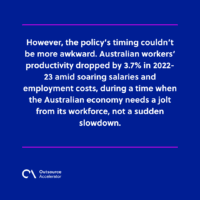Bad timing
Australia’s “right to disconnect” law, which allows employees to ignore out-of-hours messages from their bosses, is considered a labor force victory. However, it could worsen the country’s productivity woes and make the workforce uncompetitive.
Supporters of the new policy argue a need to restore work-life balance to the Australian workforce. In 2023, workers clocked an average of 281 hours of unpaid overtime, equivalent to a loss of US$7,500 each year.
However, the policy’s timing couldn’t be more awkward. Australian workers’ productivity dropped by 3.7% in 2022-23 amid soaring salaries and employment costs, during a time when the Australian economy needs a jolt from its workforce, not a sudden slowdown.
No substitute for hard work
Can we get ahead if we are just working the minimum mandated hours? Laxman Narasimhan, Starbucks’ recently ousted CEO, now infamously proclaimed that he “doesn’t work after 6 p.m.” and encouraged the struggling coffee company’s 400,000 staff to take the same approach. Laxman held firm to his convictions, even as the company’s market value dropped by $32 billion.
The reality is that work sometimes demands employees to stay after office hours to finish long or urgent projects. It goes across the organization’s hierarchy. Whether you’re a rank-and-file employee, a mid-level manager, or an executive, workloads do not remain static. The unpredictability of the business landscape calls for its employees to be ready.
More importantly, if you are young and building your career, there is no substitute for hard work. If you want to get ahead in your career and build skills, experience, and opportunities, then there is no other option than to work long and hard hours.
If you do, you will outshine your competition, which works a strict 40-hour week. It is sometimes easy to forget that many people are intrinsically motivated to work hard and to work 60+ hour weeks—because they want to get ahead and to better themselves, not because a “boss” is forcing them to do so.
Saving Australia’s productivity dip
In outsourcing markets elsewhere, people are willing to put in long hours and know the value of earning a living from hard work. They are eager to prove themselves and get ahead in their careers.
Businesses all over the world are increasingly utilizing offshore workers, which helps fill gaps in their talent pool. Outsourced employees are experts in handling various administrative tasks such as scheduling, email management, data entry, and others.
However, as their skill sets have been drastically improving over the years, they can accomplish even the most intricate tasks in various segments, such as web development, content writing, financial services, and more.
Experts claim Australia’s new policy would further drag down productivity. The government must revisit and revise its “right to disconnect” mandate to ensure businesses don’t bear the brunt and have workers who are steadfast in their daily tasks. In the meantime, Australian firms can distribute workloads to offshore workers to keep the business machine running.
The question for your business
What’s your relationship to hard work?




 Independent
Independent





















